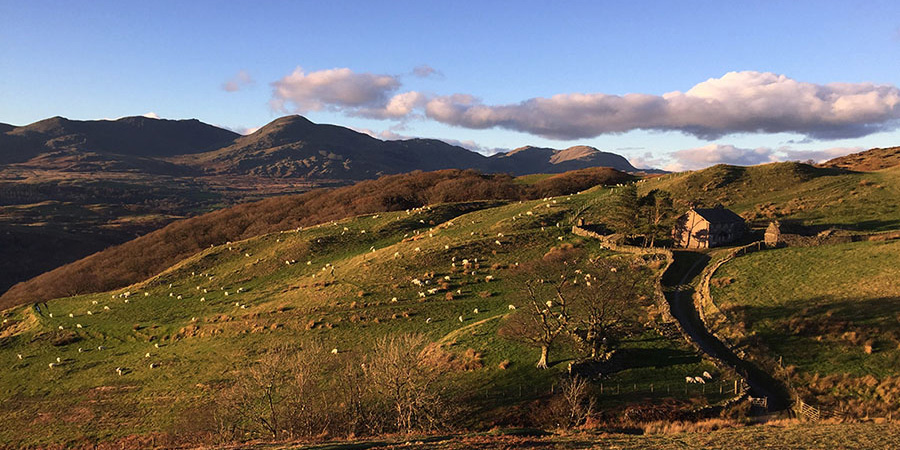Maria Benjamin from Dodgson Wood, Nibthwaite Grange Farm is creating 13 new local tweeds and cloth, using wool sourced from 13 Lake District valleys. It’s a legacy project connecting people to the history and culture of wool production in the Lakes. Importantly, farmers get a good price for their wool plus 10% of the profit from the sale of the cloth. FiPL funding supports the production of the first four tweeds.
-

The designs are inspired by the unique characteristics of each valley - from the lakes, the landscape and the geology to the former industry. For Coniston the tweed is a grey green colour, representing the slate industry, with rust hues that tell of the Coniston copper mines. Hints of white are the plumes from the steamer on the lake.
-

Wool used to be an important part of the Lake District economy, but that’s not the case now. Farmers get very little money for their wool and this project hopes to change that.
-

Over the next three years we’ll produce 13 tweeds and cloth, FiPL funding gets us started on the first four - a Coniston tweed, a Windermere tweed, an Ennerdale tweed and an Ullswater tweed.
-

The Lancs and Lakes Guild of Spinners, Weavers and Dyers are designing the tweed cloth working with Louise Dixon, a textile designer from Yorkshire.
They will then be woven and finished for clothing, upholstery as well as throws. The tweed, throws and cones of yarn, will be available to buy from our online shop.
-

This project would not be possible without FiPL funding, given the scale of it and upfront costs. I think it’s important when thinking about applying for funding, to think of it as a partnership aligning vision and values. FiPL has supported me financially but I’m supporting them by delivering on their ambitions.
-

I started by collecting two tons of wool from farmers from the four valleys we are working with. This was washed in Bradford and was then combed and spun in Yorkshire. It will be woven in Lancashire. We are keeping the processes as close together to reduce our carbon footprint.
-

Marketing is a really important part of it of this legacy project. I want this purpose-led business to grow into something that feels like it’s always been here; that it plays an important part of the future history and culture of the Lake District. It’s a business that supports our farmers and values local economies. And with support and help it is happening.
-

I farm in the Lake District with my partner John. We run a traditional beef and sheep farm as well as farm diversification businesses that makes the most of what we have, including wool.
Maria explains how her business brings together farming, cultural heritage and sustainable production, to supports farmers and value the local economy. For her, FiPL is a partnership aligning vision and values. Maria said:
“I thought this project would grow slowly and the two tons of wool I had processed in the first year for the first four valley tweeds and throws, would last around three years but it looks like I will have to re-think the plan and increase the volumes of wool processed next year and going forward.
It’s very exciting and I’ve had such lovely feedback from customers already. They love the concept and the quality of the products so I feel immensely proud.
Without the FIPL funding, I would not have had the money to invest in making the first four tweeds and at a scale which would mean I could make the tweed affordable.”
